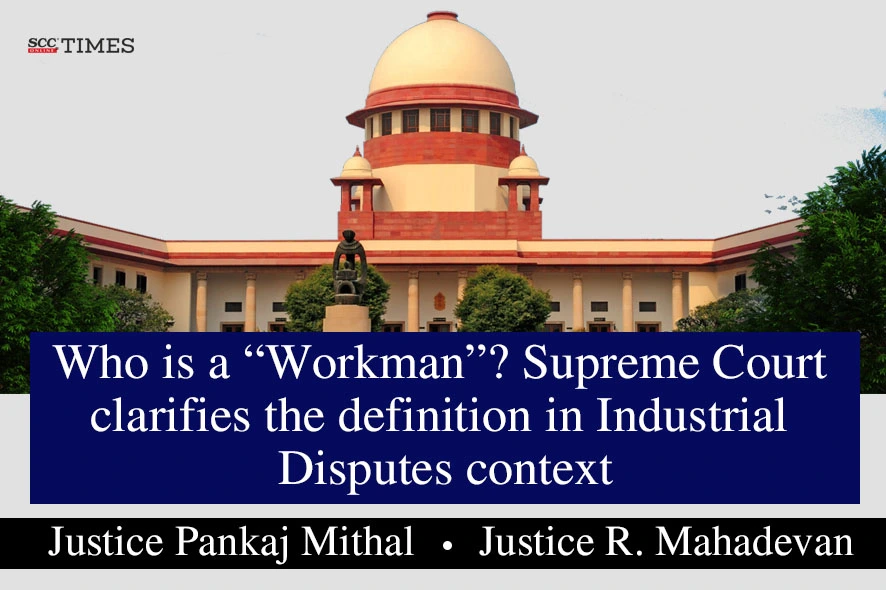Supreme Court: In two appeals filed against the order passed by Orissa High Court, wherein the Court set aside the award of the Labour Court to the extent that the employee is to be reinstated and to be paid compensation of Rs.75,000/- in lieu of back wages, while upholding the finding of the Labour Court that the employee falls under the definition of “workman” as given in Section 2(s) of the Industrial Disputes Act, 1947 (‘ID Act’) the division bench of Pankaj Mithal and R. Mahadevan*, JJ. set aside the order of the High Court confirming the finding of the Labour Court to the extent that the employee was a “workman” within the meaning of section 2(s) of the I.D. Act; and affirmed the same, insofar as setting aside the award of the Labour Court to reinstate the employee in service and pay compensation of Rs.75,000/- in lieu of back wages.
Background:
The New Indian Express, a newspaper establishment based in Bhubaneswar, employed an individual as a Junior Engineer (Electronics and Communication) starting 07-06-1997. After being confirmed in the role on 13-07-1998, he was promoted to Assistant Engineer effective and regularized in this position in 2001. However, in 2003, he was relieved from service with a month’s salary in lieu of notice, which prompted him to seek recourse through Labour authorities. Following unsuccessful conciliation efforts, the matter was referred to the Labour Court, which ruled in his favor reinstating him and awarding Rs. 75,000 in compensation, recognizing him as a “workman” under the ID Act, 1947. The management challenged this decision through a writ petition, resulting in a partial High Court ruling, leading both parties to file civil appeals.
Analysis and Decision:
The Court pointed out that the ID Act, 1947, was enacted by the legislature to settle the industrial disputes. It was brought with the object of ensuring social justice to both the employers and employees and advancing the progress of industry by bringing about the existence of harmony and cordial relationship between the parties.
After perusing Section 2(s) of the ID Act, the Court noted that a person to be qualified as a “workman” has to do any work of manual, unskilled, skilled, technical, operational, clerical or supervisory in nature. But the latter part of the Section excludes four classes of employees including a person employed in a supervisory capacity drawing wages exceeding Rs.10,000/- after amendment (Rs.1,600/- before amendment) per month or exercises functions mainly of a managerial nature.
The Court noted that as per the employee, he comes within the meaning of “workman” as given in Section 2(s) of the I.D. Act and the management without following the legal procedure, relieved him from service abruptly and hence, the same is illegal termination. However, it was the case of the management that the nature of the duties and functions performed by the employee was in the supervisory capacity and he was drawing a salary of above Rs.1,600/- and therefore, he does not belong to the category of “workmen”.
The Court further noted that Clause 14 of the appointment order issued by the management makes it clear that after confirmation of the job, the termination of service will be by one month’s notice, or one month’s salary in lieu of notice by either side.
The Court reiterated that the determinative factor for “workman” covered under Section 2(s) of the I.D. Act, is the principal duties and functions performed by an employee in the establishment and not merely the designation of his post. Further, the onus of proving the nature of employment rests on the person claiming to be a “workman” within the definition of Section 2(s) of the I.D. Act.
The Court noted that in the present case, there is no specific document drawn up relating to the actual work and functions performed by the employee.
In the absence of any concrete material to demonstrate the nature of duties discharged by the employee, the Court considered the employment orders issued by the management, and noted that, the employee was appointed as Junior Engineer and was promoted as Assistant Engineer, on the administrative side. The employee was supervising the work of two junior Engineers, who were working under him, which was also admitted by the employee in his cross examination. Even according to the employee, the nature of duties and functions discharged by him was supervisory.
Further, the Court applied the pre-amended provision of section 2(s), since the employee was terminated from service on 08-10-2003 and was drawing salary of more than Rs.1,600/- and said that he does not come within the definition of “workman”.
Therefore, the Court held that the employee is not a “workman” as defined under section 2(s) and is not covered by the provisions of the I.D. Act. Therefore, the Court set aside the order of the High Court upholding the finding of the Labour Court that the employee was a “workman” within the definition of post-amended section 2(s).
The Court also concluded that there is no violation of procedure on the part of the management in terminating the services of the employee, as he was not a “workman” as covered under Section 2(s) and hence, the provisions of the I.D. Act do not apply to him. Thus, the Court did not find any infirmity or illegality in the order of the High Court setting aside the award of the Labour Court which directed reinstatement of the employee along with payment of compensation in lieu of back wages.
CASE DETAILS
|
Citation: Appellants : Respondents : |
Advocates who appeared in this case For Petitioner(s): For Respondent(s): |
CORAM :









